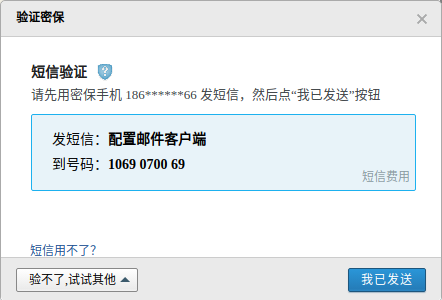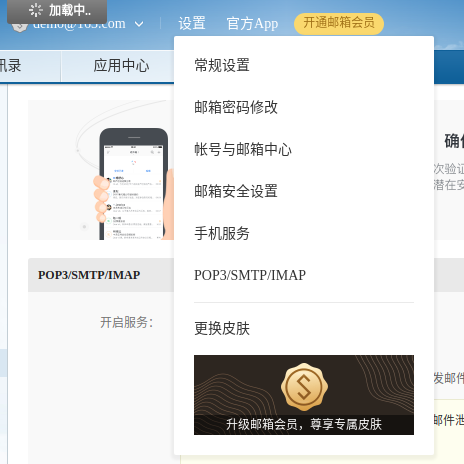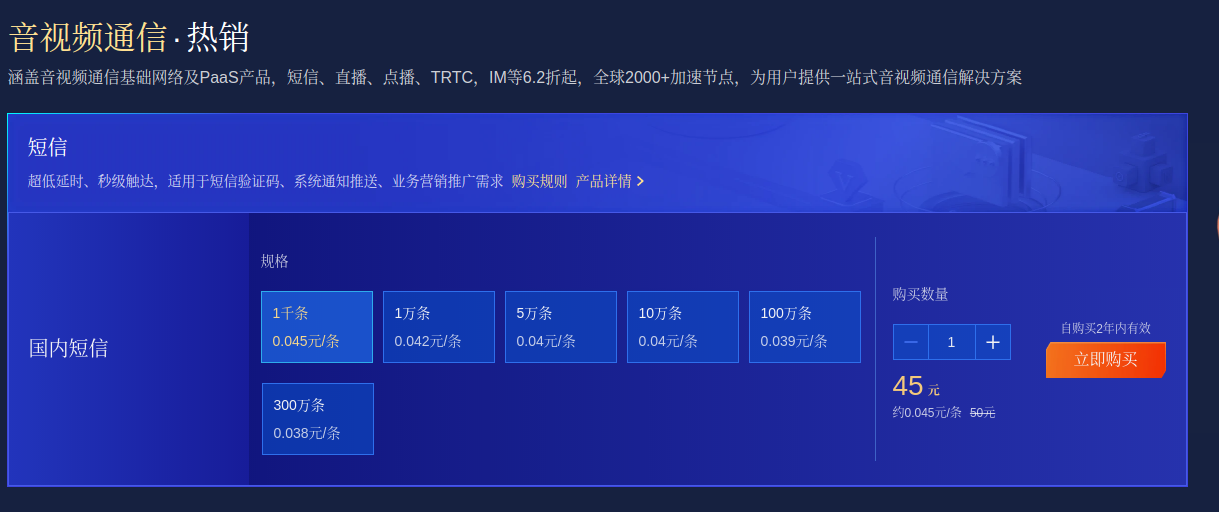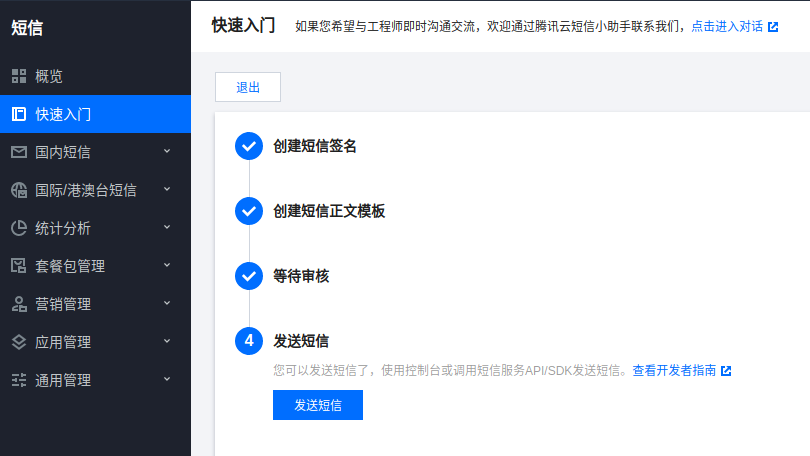导语:之前做过一个小项目,其中用到了图形验证码,邮箱和手机号注册登录,这三者基本上是现在网站常用的验证方法,现在就做一个使用操作总结。
# 目录
- 准备工作
- 原理解析
- 方法总结
- 在线体验
# 准备工作
# 安装依赖包
继续打开上次新建的demo文件夹,下载几个依赖包。
npm install svg-captcha nodemailer tencentcloud-sdk-nodejs --save
- svg-captcha 可以创建图形验证码
- nodemailer 可以发送电子邮件
- tencentcloud-sdk-nodejs 可以发送短信
# 申请准备
除了图形验证码可以安装后直接使用外,其他两个必须向邮箱服务商和云计算运营商申请授权密钥。
# 电子邮件申请方法
推荐网站:
QQ邮箱申请步骤:
打开QQ邮箱 (opens new window)登录进去;
点击设置,然后打开账户选项卡,点击开启POP3/SMTP服务;

- 点击生成授权码,发送短信,点击我已发送,复制授权码到一个记事本里面去;

发送邮件服务器:smtp.qq.com,使用SSL,端口号465或587
网易邮箱申请步骤:
打开163邮箱 (opens new window)登录进去;
点击设置,然后打开设置选项卡,点击POP3/SMTP/IMAP;


- 点击开启POP3/SMTP服务,发送短信,点击我已发送,复制授权码到一个记事本里面去;


# 手机短信申请方法
本次使用的是腾讯云提供的短信服务。
- 打开腾讯云官网 (opens new window)注册登录进去;
- 打开短信产品页面 (opens new window),现在是618活动期间,购买短信,大约1000条,38元;

- 然后点击控制台到短信控制台页面 (opens new window)查看短信套餐;

- 接下来就是短信开通配置,参考这篇文章国内短信快速入门 (opens new window);

按照上面操作完成后,你可以得到应用id和模板id。
到此,这个整个申请流程就结束了。
# 原理解析
基本上几个验证方式都大同小异,可以共同归纳为以下几个步骤:
- 创建/发送验证码内容
- 验证是否正确
下面具体描述一下这个步骤。
# 创建/发送验证码内容
- 图形验证码
当我们去请求一个api地址的时候,首先引入依赖包,配置好参数,生成一个svg格式的图形,然后响应请求,发送svg数据,就可以看到一个N位字符的图片了。
- 邮箱验证码
到引入邮箱依赖包,配置好参数,然后去调用发送邮件方法,最后打开请求发送的邮箱账户,就可以看到一封电子邮件。
- 手机
到引入手机依赖包,配置好参数,然后去调用发送短信方法,最后打开请求发送的手机短信app,就可以看到一条短信了。
# 验证是否正确
- 客户端提交参数;
- 服务端检测是否输入正确,返回提示信息;
# 方法总结
本小节主要是封装一些常用的方法,然后编写脚本文件。
打开demo文件夹,创建一个captcha的文件夹,然后新建config.js,主要是放置一些配置信息;新建一个api.js,主要是放置一些常用方法。
然后新建svg,email,phone三个文件夹,并且各自新建index.js文件。
get请求方式用于发送验证码,post请求方式用于验证验证码。
# 常用方法
打开config.js文件:
// 图形,邮箱,手机的验证码
const svg = {
size: 4, // 验证码长度
ignoreChars: '012oOiILl', // 验证码字符中排除 0o1i
noise: 1, // 干扰线条的数量
fontSize: 52,
color: true, //开启文字颜色
// background:"#000",//背景色
width: 200,
height: 80,
time: 2*60,
}
const email = {
service: 'qq',
port: 465,
secure: true,
user: 'xxx@xx.com',
pass: 'xxxxxxxxxxxxxx',
from: 'xxx@xx.com',
time: 2*60,
}
const phone = {
secretId: 'XXXXXXXXXXXXXXXXXXXXXXXXXXXXXXXX',
secretKey: 'XXXXXXXXXXXXXXXXXXXXXXXXXXXXXXXX',
reqMethod: "POST",
reqTimeout: 30,
endpoint: "sms.tencentcloudapi.com",
signMethod: "HmacSHA256",
region: "ap-shanghai",
SmsSdkAppid: "XXXXXXX", // 应用id
Sign: "DEMO",
ExtendCode: "",
SenderId: "",
SessionContext: "",
TemplateID: {
eg: "XXXXXX",
},
time: 2*60,
}
module.exports = {
svg,
email,
phone
}
2
3
4
5
6
7
8
9
10
11
12
13
14
15
16
17
18
19
20
21
22
23
24
25
26
27
28
29
30
31
32
33
34
35
36
37
38
39
40
41
42
43
44
45
46
47
打开api.js文件:
- 检测方法
//一个检测验证码是否正确的方法;
/*
*infoType 检测类型: svg,email,phone
*codeInfo 服务端的验证码 session信息
*verifyInfo 客户端提交的验证码信息
*/
function check (res, req, infoType, codeInfo, verifyInfo) {
let type = infoType == 'svg' ? 'svgInfo' :
infoType == 'email' ? 'emailInfo' : 'phoneInfo';
let typeText = infoType == 'svg' ? '图形' :
infoType == 'email' ? '邮箱' : '手机';
if (!Object.keys(codeInfo).length) {
return res.json({
code: 101,
msg: 'get_fail',
data: {
info: `请重新获取${typeText}验证码!`
}
})
}
if (infoType != 'phone') {
codeInfo.code = codeInfo.code.toLowerCase();
}
if (!verifyInfo.code) {
return res.json({
code: 101,
msg: 'get_fail',
data: {
info: `${typeText}验证码不能为空!`
}
})
}
if (infoType == 'email' ||
infoType == 'phone') {
if (!verifyInfo[infoType]) {
return res.json({
code: 101,
msg: 'get_fail',
data: {
info: `${typeText}不能为空!`
}
})
}
if (verifyInfo[infoType] != codeInfo[infoType]) {
return res.json({
code: 101,
msg: 'get_fail',
data: {
info: `${typeText}账号错误!`
}
})
}
}
if (codeInfo.isVerify == 1) {
return res.json({
code: 101,
msg: 'get_fail',
data: {
info: `${typeText}验证码已经验证!`
}
})
}
if (((verifyInfo.time - codeInfo.time)/1000) > 60) {
return res.json({
code: 101,
msg: 'get_fail',
data: {
info: `${typeText}验证码已经过期!`
}
})
}
if (verifyInfo.code != codeInfo.code) {
return res.json({
code: 101,
msg: 'get_fail',
data: {
info: `${typeText}验证码错误!`
}
})
}
req.session[type].isVerify = 1;
return res.json({
code: 200,
msg: 'get_succ',
data: {
info: `${typeText}验证码验证成功!`
}
})
}
2
3
4
5
6
7
8
9
10
11
12
13
14
15
16
17
18
19
20
21
22
23
24
25
26
27
28
29
30
31
32
33
34
35
36
37
38
39
40
41
42
43
44
45
46
47
48
49
50
51
52
53
54
55
56
57
58
59
60
61
62
63
64
65
66
67
68
69
70
71
72
73
74
75
76
77
78
79
80
81
82
83
84
85
86
87
88
89
- 发送邮件信息
const nodemailer = require('nodemailer');
const emailConfig = require('./config').email;
// option 配置参数
function sendMail (res, option) {
let transporter = nodemailer.createTransport({
service: emailConfig.service,
port: 465,
secureConnection: true,
auth: {
user: emailConfig.user,
pass: emailConfig.pass
}
})
return transporter.sendMail(option, (error, info) => {
if (error) {
return res.json({
code: 101,
msg: 'get_fail',
data: {
info: '发送失败,请重试!',
des: error
}
})
} else {
return res.json({
code: 200,
msg: 'get_succ',
data: {
info: '发送成功,请注意查收!'
}
})
}
})
}
2
3
4
5
6
7
8
9
10
11
12
13
14
15
16
17
18
19
20
21
22
23
24
25
26
27
28
29
30
31
32
33
34
- 发送手机短信
/*
* phoneNo 手机号
* type 模板类型
* phoneCode 6位数字验证码
*/
const tencentcloud = require('tencentcloud-sdk-nodejs');
const phoneConfig = require('./config').phone;
function sendSms (phoneNo, type, phoneCode) {
// 导入对应产品模块的client models。
const smsClient = tencentcloud.sms.v20190711.Client
/* 实例化要请求产品(以sms为例)的client对象 */
const client = new smsClient({
credential: {
/* 必填:腾讯云账户密钥对secretId,secretKey。
* 这里采用的是从环境变量读取的方式,需要在环境变量中先设置这两个值。
* 你也可以直接在代码中写死密钥对,但是小心不要将代码复制、上传或者分享给他人,
* 以免泄露密钥对危及你的财产安全。
* CAM密匙查询: https://console.cloud.tencent.com/cam/capi */
secretId: phoneConfig.secretId,
secretKey: phoneConfig.secretKey,
},
/* 必填:地域信息,可以直接填写字符串ap-guangzhou,或者引用预设的常量 */
region: phoneConfig.region,
/* 非必填:
* 客户端配置对象,可以指定超时时间等配置 */
profile: {
/* SDK默认用TC3-HMAC-SHA256进行签名,非必要请不要修改这个字段 */
signMethod: phoneConfig.signMethod,
httpProfile: {
/* SDK默认使用POST方法。
* 如果你一定要使用GET方法,可以在这里设置。GET方法无法处理一些较大的请求 */
reqMethod: phoneConfig.reqMethod,
/* SDK有默认的超时时间,非必要请不要进行调整
* 如有需要请在代码中查阅以获取最新的默认值 */
reqTimeout: phoneConfig.reqTimeout,
/**
* SDK会自动指定域名。通常是不需要特地指定域名的,但是如果你访问的是金融区的服务
* 则必须手动指定域名,例如sms的上海金融区域名: sms.ap-shanghai-fsi.tencentcloudapi.com
*/
endpoint: phoneConfig.endpoint
},
},
})
/* 请求参数,根据调用的接口和实际情况,可以进一步设置请求参数
* 属性可能是基本类型,也可能引用了另一个数据结构
* 推荐使用IDE进行开发,可以方便的跳转查阅各个接口和数据结构的文档说明 */
const smsParams = {
/* 短信应用ID: 短信SdkAppid在 [短信控制台] 添加应用后生成的实际SdkAppid,示例如1400006666 */
SmsSdkAppid: phoneConfig.SmsSdkAppid,
/* 短信签名内容: 使用 UTF-8 编码,必须填写已审核通过的签名,签名信息可登录 [短信控制台] 查看 */
Sign: phoneConfig.Sign,
/* 短信码号扩展号: 默认未开通,如需开通请联系 [sms helper] */
ExtendCode: phoneConfig.ExtendCode,
/* 国际/港澳台短信 senderid: 国内短信填空,默认未开通,如需开通请联系 [sms helper] */
SenderId: phoneConfig.SenderId,
/* 用户的 session 内容: 可以携带用户侧 ID 等上下文信息,server 会原样返回 */
SessionContext: phoneConfig.SessionContext,
/* 下发手机号码,采用 e.164 标准,+[国家或地区码][手机号]
* 示例如:+8613711112222, 其中前面有一个+号 ,86为国家码,13711112222为手机号,最多不要超过200个手机号*/
PhoneNumberSet: [`+86${phoneNo}`],
/* 模板 ID: 必须填写已审核通过的模板 ID。模板ID可登录 [短信控制台] 查看 */
TemplateID: phoneConfig.TemplateID[type],
/* 模板参数: 若无模板参数,则设置为空*/
TemplateParamSet: [phoneCode],
}
// 通过client对象调用想要访问的接口,需要传入请求对象以及响应回调函数
return new Promise(function (resolve, reject) {
// 通过 client 对象调用想要访问的接口,需要传入请求对象以及响应回调函数
client.SendSms(smsParams, function (err, response) {
// 请求异常返回,打印异常信息
if (err) {
reject({
code: 102,
info: 'get_fail',
data: {
info: '操作失败!',
detail: err
}
});
}
resolve({
code: 200,
info: 'get_succ',
data: {
info: '操作成功!',
response
}
});
});
})
}
2
3
4
5
6
7
8
9
10
11
12
13
14
15
16
17
18
19
20
21
22
23
24
25
26
27
28
29
30
31
32
33
34
35
36
37
38
39
40
41
42
43
44
45
46
47
48
49
50
51
52
53
54
55
56
57
58
59
60
61
62
63
64
65
66
67
68
69
70
71
72
73
74
75
76
77
78
79
80
81
82
83
84
85
86
87
88
89
90
91
92
93
94
# 验证码程序
# 图形验证码
写入以下代码:
const express = require('express');
const app = express();
const svgCaptcha = require('svg-captcha');
const config = require('../config');
const api = require('../api');
app.get('/svg', (req, res) => {
// 创建图像
const svgImg = svgCaptcha.create(config.svg);
req.session.svgInfo = {
code: svgImg.text,
time: new Date().getTime(),
isVerify: 0,
};
// 发送
res.type('svg');
res.status(200).send(svgImg.data);
});
app.post('/svg', (req, res) => {
// 验证信息
let svgInfo = {...req.session.svgInfo};
let code = req.body.code;
let verifyInfo = {
code,
time: new Date().getTime(),
};
// 检测信息
return api.check(res, req, 'svg', svgInfo, verifyInfo);
});
2
3
4
5
6
7
8
9
10
11
12
13
14
15
16
17
18
19
20
21
22
23
24
25
26
27
28
29
30
31
32
33
34
# 邮箱验证码
const express = require('express');
const app = express();
const config = require('../config');
const api = require('../api');
app.get('/email', (req, res) => {
// 验证参数
let email = req.query.email;
if (!email) {
return res.json({
code: 101,
msg: 'get_fail',
data: {
info: '邮箱账号不能为空!'
}
})
}
// 邮箱配置
let emailInfo = {...req.session.emailInfo};
console.log('get email info:', emailInfo);
let emailParams = {
email,
time: new Date().getTime(),
};
let emailConfig = config.email;
let emailCode = (Math.random() * Math.pow(52, 2)).toString(36).slice(4, 10);
let option = {
from: `"前端实验室" <${emailConfig.from}>`,
to: email,
subject: '邮箱验证码',
text: `尊敬的用户您好:您的邮箱验证码是${emailCode},有效期${emailConfig.time/60}分钟,请尽快使用!`,
html: ''
}
// 邮箱验证码检测
if (emailInfo &&
email === emailInfo.email &&
((emailInfo.time - emailParams.time)/1000) < emailConfig.time) {
return res.json({
code: 101,
msg: 'get_fail',
data: {
info: '该邮箱验证码已发送!'
}
})
} else {
let emailInfo = {
code: emailCode,
email,
time: new Date().getTime(),
isVerify: 0,
};
console.log('save email info:', emailInfo);
req.session.emailInfo = emailInfo;
}
// 发送邮件
return api.sendMail(res, option);
});
app.post('/email', (req, res) => {
let emailInfo = {
...req.session.emailInfo
};
let code = req.body.code;
let email = req.body.email;
let verifyInfo = {
email,
code,
time: new Date().getTime(),
};
return api.check(res, req, 'email', emailInfo, verifyInfo);
});
2
3
4
5
6
7
8
9
10
11
12
13
14
15
16
17
18
19
20
21
22
23
24
25
26
27
28
29
30
31
32
33
34
35
36
37
38
39
40
41
42
43
44
45
46
47
48
49
50
51
52
53
54
55
56
57
58
59
60
61
62
63
64
65
66
67
68
69
70
71
72
73
74
75
76
77
78
# 手机验证码
const express = require('express');
const app = express();
const config = require('../config');
const api = require('../api');
app.get('/phone', async (req, res) => {
// 验证参数
let phone = req.query.phone;
if (!phone) {
return res.json({
code: 101,
msg: 'get_fail',
data: {
info: '手机账号不能为空!'
}
})
}
// 手机配置
let phoneInfo = {...req.session.phoneInfo};
console.log('get phone info:', phoneInfo);
let phoneParams = {
phone,
time: new Date().getTime(),
};
let phoneConfig = config.phone;
let phoneCode = Math.ceil(Math.random() * 1000000);
// 手机验证码检测
if (phoneInfo &&
phone === phoneInfo.phone &&
((phoneInfo.time - phoneParams.time)/1000) < phoneConfig.time) {
return res.json({
code: 101,
msg: 'get_fail',
data: {
info: '该手机验证码已发送!'
}
})
} else {
let phoneInfo = {
code: phoneCode,
phone,
time: new Date().getTime(),
isVerify: 0,
};
console.log('save phone info:', phoneInfo);
req.session.phoneInfo = phoneInfo;
}
// 发送手机
let phoneSet = await api.sendSms(phone, 'eg', phoneCode);
if (phoneSet.code === 200) {
return res.json({
code: 200,
msg: 'get_succ',
data: {
info: '发送成功,请注意查收!',
err: phoneSet.data.detail
}
})
} else {
return res.json({
code: 101,
msg: 'get_fail',
data: {
info: '发送失败,请重试!'
}
})
}
});
app.post('/phone', (req, res) => {
let phoneInfo = {
...req.session.phoneInfo
};
let code = req.body.code;
let phone = req.body.phone;
let verifyInfo = {
phone,
code,
time: new Date().getTime(),
};
return api.check(res, req, 'phone', phoneInfo, verifyInfo);
});
2
3
4
5
6
7
8
9
10
11
12
13
14
15
16
17
18
19
20
21
22
23
24
25
26
27
28
29
30
31
32
33
34
35
36
37
38
39
40
41
42
43
44
45
46
47
48
49
50
51
52
53
54
55
56
57
58
59
60
61
62
63
64
65
66
67
68
69
70
71
72
73
74
75
76
77
78
79
80
81
82
83
84
85
86
87
88
# 在线体验
如果想要体验这个功能,这里有个小奇工具 (opens new window)应用,可以进行注册和登录以及图形、邮箱和手机验证。
# 写在最后
以上就是我开发的一些经验总结,如果有什么问题,请邮箱联系我,我一定抽出时间查看,不对的地方进行修正。




